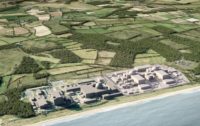U.K. electricity consumers will have to share the construction risk of the next nuclear power plant under government plans to adopt the Regulated Asset Based (RAB) system for infrastructure financing.
The system will replace the up-front price setting approach used for the 3,200-MW Hinkley Point C plant now under construction and could reduce or eliminate Chinese involvement in the planned same-sized Sizewell C plant, expected to be built next. Both are located in England.
Using the RAB approach, a developer can secure debt and equity financing, funded to a large degree by consumers in their regular electricity bills from the start of a project.
The method, widely used in the U.K. water and other utility sectors, spreads the developer’s construction risk and should cut the cost of financing. Electricity tariffs would be regulated by the existing Office of Gas and Electricity Markets.
The move was welcomed by Tom Thackray, decarbonization program director at the Confederation of British Industry, a lobbying group. “The RAB model ... has the potential to secure backing from a wide range of investors," he said.
But said Alison Downes, spokeswoman for Stop Sizewell C campaign, “RAB is a desperate measure to attract investment for Sizewell C, a project so toxic that no one wants to pay for it.”
Energy Minister Greg Hands said average electricity bills would rise by less than $17 per year during the full construction phase of a large project.
RAB will replace the Contracts for Difference (CfD) system, which led to "too many overseas nuclear developers walking away from projects," according to Kwasi Kwarteng, Secretary of State for business, energy and industrial strategy .
Hitachi’s 2,700-MW project at Wylfa Newydd in Wales and Toshiba’s 3,400-MW plant at Moorside in England, have both been abandoned in the last three years.
Now in its fifth year of construction, the 3,200-MW Hinkley Point C, in Somerset, was set up using the CfD approach in 2016. The developer was guaranteed a price of $127 per MWh at 2012 prices for 35 years of generation.
For that project, the developer has to bear cost hikes already reaching 30%. French state controlled EDF Energy is the project's majority shareholder with Beijing-based China General Nuclear Corp. holding a minority share.
The RAB policy is "is a big step forward," says a spokesperson for the Sizewell C team. The project is going through various permitting steps and could be ready for financing at the end of 2022.
Under the original Hinkley Point C deal, EDF would again lead China General as Sizewell's project owner. The Chinese company was also in the running to control development of the Bradwell B plant, in Maldon, England. Regulatory assessment of China’s HPR1000 reactor "is on-track for completion in early 2022," the firm says.
However, U.K.-Chinese relations have chilled since the original deal in 2016, raising political doubts over China General's continuing involvement in the country’s critical infrastructure.
The RAB approach would eliminate need for Chinese financing. By widening the pool of potential institutional investors, the system would reduce "the U.K.’s reliance on overseas developers for financing new nuclear projects,” the government claims.





Post a comment to this article
Report Abusive Comment